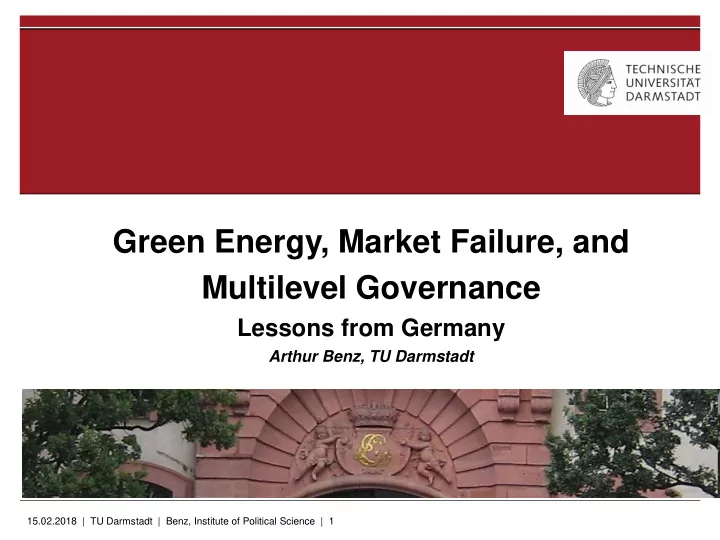

Green Energy, Market Failure, and Multilevel Governance Lessons from Germany Arthur Benz, TU Darmstadt 15.02.2018 | TU Darmstadt | Benz, Institute of Political Science | 1
Transformation of energy system Transformation Process of a fundamental change in the long term Energy non renewable versus renewable (green) energy System Technology, market, politics, society 15. Februar 2018 | Fachbereich 02 | Institut für Politikwissenschaft | Arthur Benz | 2
Approach to promote green energy – the Germany model establised in 1991; revised in 2000, amended in 2004, 2009, 2012, 2014…. Regulation of market access for renewable energy : Energy suppliers are compelled to feed-in green energy Incentives to invest in green energy : guaranteed feed-in tarifs, market premium Disincentives for energy consumption : surcharge on electricity prize (levy to finance subsidies) copied by governments in many countries (Ontario: 2009 Green Energy and Green Economic Act). 15. Februar 2018 | Fachbereich 02 | Institut für Politikwissenschaft | Arthur Benz | 3
Market-conforming approach: Market as driver of transformation Regulation: opening market for green energy Subsidies to make new technologies competitive financed by consumers (internalization of social costs) incremental adjustment of subsidies to technological and market development (administrative fine-tuning) since 2014: subsidies determined by auctions (except small-scale installations) 15. Februar 2018 | Fachbereich 02 | Institut für Politikwissenschaft | Arthur Benz | 4
Transformative and systemic effects Increasing share of green energy (mainly electricity) Decentralisation of energy supply Restructuring of energy industry Dissolution of old corporatist structures in energy policy New patterns of participation of stake holders, experts and civil society Dynamics of energy policy: paradigm change: focus on „Energiewende“ „Policy Spill - over “ from electricity to heating, transport etc. 15. Februar 2018 | Fachbereich 02 | Institut für Politikwissenschaft | Arthur Benz | 6
„Market failure“: Consequences of transformative dynamics in electricity market Externalities and collective good problems Limited capacities of grid (natural monopoly) Externalities of energy installations: Impacts on environment, local conflicts Cross-boarder externalities in the EU energy market Oversupply of power in Germany causes grid congestion in neighboring countries (Austria, Poland, Czech Republic) Oversupply of power sold at a low prize threatens pumped- storage power plant in Switzerland and Austria 15. Februar 2018 | Fachbereich 02 | Institut für Politikwissenschaft | Arthur Benz | 7
„Market failure“: Consequences of transformative dynamics Distributive effects Social effects Discharge of electricity-intensive companies increasing electricity costs and costs of energy efficient devises burden people with low income Territorial effects between regions different production structures different balances of subsidies and surcharge 15. Februar 2018 | Fachbereich 02 | Institut für Politikwissenschaft | Arthur Benz | 8
Social distributive effects Electricity prices and power cut-offs 15. Februar 2018 | Fachbereich 02 | Institut für Politikwissenschaft | Arthur Benz | 9
Territorial distributive effects Source: Growitsch,Meier,Schleich, Regionale Verteilungswirkungen des Erneuerbare-Energiene-Gesetzes; Perspektiven der Wirtschaftspolitik 16 (1), 2015, p. 78
Political responses and politicization Grid development as indispensible prerequisite: • central planning, federal law, federal administration • A powerful corporatist structure , open to citizen participation Conflicts at regional and local level: politicization from below Bilateral cross-border coordination (executives, experts) Assistance to consumers in need: local governments providing advise and financial support, pilot projects by Land governments Territorial equalization mechanism, yet extremely complicated and not really working Party politics : Populist responses to rising electricity prizes Risk of path-dependency, blockades and return to old energies
Transformation and multilevel governance Coping with market failure at different levels Negotiated policy-making, but rarely joint decision-making Multilevel: loosely coupled arenas of policy-making e.g. platforms “ Energiewende ” of Federal Ministry of Economy e.g. forum “Future of Energy” in Land Hesse local public-private networks European Energy Union as “soft power” Multilevel governance : policy learning based on decentralized innovation, diffusion, and (central) monitoring dynamic, process, flexible, incremental adjustment responsible politics, evidence based, consultation with civil society 15. Februar 2018 | Fachbereich 02 | Institut für Politikwissenschaft | Arthur Benz | 12
Recommend
More recommend